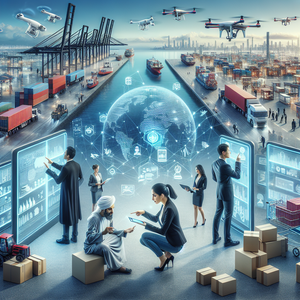
15 Careers Reshaping Trade, Retail, and Supply Chains in the Tariff-Driven Economy
In an interconnected global economy, tariff policies have profound ripple effects, influencing industries, supply chains, and consumer behavior. Tariffs—taxes imposed on imported goods—have been a contentious topic in the United States and beyond, creating both challenges and opportunities. While some argue that tariffs protect domestic industries, others contend they increase costs for businesses and consumers alike. Regardless of where one stands on the debate, it’s clear that tariffs have reshaped the job market, spurring demand for professionals skilled in navigating these complexities. From trade compliance experts to supply chain strategists, careers aimed at mitigating the effects of tariffs are flourishing. For example, a U.S.-based electronics company recently revamped its logistics team to address shipping delays caused by higher import taxes on Asian goods. Similarly, grocery retailers have recruited procurement managers and data analysts to offset the rising costs of imported produce. These jobs illustrate how companies are rethinking strategies to stay competitive. This article highlights 15 careers that have gained prominence in this tariff-driven landscape. By exploring their responsibilities, qualifications, and real-world relevance, we aim to shed light on how professionals are shaping the future of trade, retail, and supply chains.
Job Summaries:
Trade Compliance Specialist:
- Trade compliance specialists ensure businesses adhere to evolving international trade laws and tariff regulations.
- They classify goods under the Harmonized Tariff Schedule, track policy changes, and prepare customs documentation.
- For example, during the U.S.-China trade dispute, many manufacturers leaned on these specialists to avoid costly legal missteps.
- A degree in international business or law, along with certifications like the Certified Customs Specialist (CCS), is often required.
- These professionals are indispensable in navigating today’s increasingly intricate trade landscape.
Supply Chain Analyst:
- Tariffs have disrupted global supply chains, creating demand for analysts who can identify inefficiencies and minimize costs.
- Using tools like SAP and Tableau, they optimize sourcing, shipping, and inventory strategies.
- A major retailer redesigned its logistics network to reduce dependence on high-tariff regions—an initiative spearheaded by supply chain analysts.
- Candidates with backgrounds in logistics, data analysis, or supply chain management are highly sought after.
Procurement Manager:
- Procurement managers are at the forefront of minimizing tariff-related costs.
- They renegotiate supplier contracts, explore alternative sourcing options, and assess domestic versus international supply chains.
- When tariffs on steel imports spiked, many manufacturers turned to procurement experts to find cost-effective solutions.
- Certifications like the Certified Professional in Supply Management (CPSM) are valuable in this role, which combines negotiation skills with global trade expertise.
Financial Risk Analyst:
- As tariffs introduce economic volatility, financial risk analysts are essential in helping businesses navigate uncertainties.
- They assess how tariffs impact profitability, forecast market trends, and develop risk mitigation strategies.
- For example, when tariffs on agricultural goods disrupted the farming sector, analysts provided actionable insights to stabilize operations.
- A degree in finance or economics, coupled with strong quantitative skills, is key for success in this role.
Logistics Coordinator:
- Logistics coordinators are pivotal in addressing tariff-related disruptions in the transportation and storage of goods.
- Their responsibilities include optimizing shipping routes, managing customs compliance, and tracking inventory.
- A U.S. electronics manufacturer recently hired several coordinators to offset shipping delays tied to new tariffs on Chinese imports.
- A background in supply chain management and certifications like the Certified Supply Chain Professional (CSCP) are often required.
Tariff Analyst:
- Tariff analysts specialize in evaluating the financial and operational effects of tariffs on businesses.
- They research trade agreements, analyze tariff schedules, and recommend cost-saving sourcing strategies.
- For instance, during the U.S.-Mexico-Canada Agreement (USMCA) revisions, many companies leaned on tariff analysts for guidance.
- A degree in international trade or economics and strong analytical skills are critical for this role.
Retail Pricing Strategist:
- Retail pricing strategists are instrumental in adjusting pricing models to account for tariff-induced cost increases.
- For example, when tariffs on imported goods raised grocery prices, a major retailer hired pricing strategists to maintain profitability without alienating customers.
- A background in economics, marketing, or data analytics is essential, as is the ability to balance market trends with consumer affordability.
Manufacturing Operations Manager:
- The resurgence of domestic manufacturing, spurred by tariffs on imported goods, has increased demand for operations managers.
- These professionals optimize production processes, source raw materials locally, and ensure compliance with trade regulations.
- For example, a U.S. automotive company recently expanded its domestic production facilities, requiring skilled managers to oversee operations.
- A degree in industrial engineering or business is often necessary.
Economic Policy Advisor:
- Economic policy advisors bridge the gap between business and government by analyzing the broader implications of tariff policies.
- They provide strategic recommendations to mitigate trade disruptions and support affected industries.
- During the U.S.-China trade war, advisors played a key role in crafting policies to aid farmers hit by retaliatory tariffs.
- Advanced degrees in economics or public policy are typically required.
Retail Supply Chain Strategist:
- Retailers are turning to supply chain strategists to mitigate the effects of tariffs on their operations.
- These professionals optimize sourcing, inventory, and logistics to maintain profitability.
- For instance, a clothing retailer recently hired strategists to reduce reliance on high-tariff textile imports.
- Proficiency in data analytics tools and experience in supply chain management are essential.
Customs Broker:
- Customs brokers ensure smooth cross-border trade by managing tariff documentation and compliance.
- They’ve become increasingly valuable as businesses grapple with ever-changing trade policies.
- Industries heavily reliant on imports, such as electronics, rely on brokers to navigate customs complexities.
- Certification as a Licensed Customs Broker is a must for this role.
Consumer Behavior Analyst:
- Tariffs have shifted consumer preferences, creating demand for analysts who can interpret these changes.
- During the U.S.-China trade dispute, many consumers began favoring domestic products, prompting companies to adjust their marketing strategies.
- A background in marketing, psychology, or data science is key for this role.
Import/Export Manager:
- Import/export managers oversee international trade operations, ensuring compliance with tariff regulations and optimizing shipping processes.
- They play a vital role in minimizing costs and maintaining efficiency.
- Certifications like the Certified U.S. Export Compliance Officer (CUSECO) are highly advantageous in this field.
Retail Operations Manager:
- Retail operations managers work behind the scenes to offset tariff-related cost increases.
- They implement efficiency measures across in-store and online operations, ensuring businesses remain competitive.
- A degree in business administration and experience in retail management are crucial for this role.
Data Scientist – Trade Analytics:
- Data scientists specializing in trade analytics use advanced modeling techniques to evaluate the impact of tariffs on pricing, supply chains, and consumer behavior.
- Their insights help businesses adapt to new trade realities.
- For example, a major logistics company recently hired data scientists to predict tariff-driven disruptions.
- Expertise in machine learning, Python, and R is essential.
The tariff-driven economy has reshaped industries, spurring demand for professionals who can navigate its complexities. From trade compliance specialists to data-driven strategists, these careers demonstrate the importance of resilience and innovation in today’s global landscape. Whether you’re a seasoned professional or exploring new opportunities, these roles offer a path to success in a world shaped by evolving trade policies. With the right expertise, you can not only adapt to these changes but also thrive in an economy that rewards ingenuity and adaptability.
Explore More Jobs

